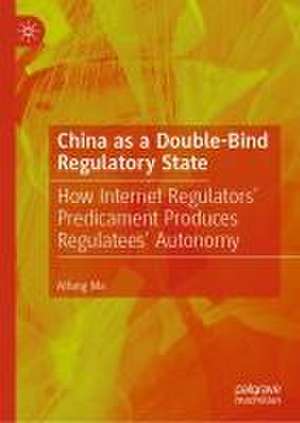China as a Double-Bind Regulatory State: How Internet Regulators’ Predicament Produces Regulatees’ Autonomy
Autor Aifang Maen Limba Engleză Hardback – 9 mar 2024
Preț: 733.78 lei
Preț vechi: 894.85 lei
-18% Nou
Puncte Express: 1101
Preț estimativ în valută:
140.41€ • 152.100$ • 118.31£
140.41€ • 152.100$ • 118.31£
Carte tipărită la comandă
Livrare economică 23 aprilie-07 mai
Preluare comenzi: 021 569.72.76
Specificații
ISBN-13: 9789819988563
ISBN-10: 981998856X
Ilustrații: XXI, 371 p. 15 illus., 14 illus. in color.
Dimensiuni: 148 x 210 mm
Greutate: 0.62 kg
Ediția:2024
Editura: Springer Nature Singapore
Colecția Palgrave Macmillan
Locul publicării:Singapore, Singapore
ISBN-10: 981998856X
Ilustrații: XXI, 371 p. 15 illus., 14 illus. in color.
Dimensiuni: 148 x 210 mm
Greutate: 0.62 kg
Ediția:2024
Editura: Springer Nature Singapore
Colecția Palgrave Macmillan
Locul publicării:Singapore, Singapore
Cuprins
Chapter 1: Introduction.- Chapter 2: A Conceptual Scheme for the Double-Bind Regulatory State.- Chapter 3: Particularities of the Economic Regulation of the ISM Industry.- Chapter 4: Particularities of the Political Regulation of the ISM Industry.- Chapter 5: Economic Versus Political Goals.- Chapter 6: The Dynamics of Fragmented Authoritarianism.- Chapter 7: Global Leadership Comes at a Price.- Chapter 8: The Double-Bind Regulation Beyond China.
Notă biografică
Dr. Aifang Ma is currently a Boya Postdoctoral Scholar and a Lecturer at the School of Journalism and Communication, Peking University. She obtains her Ph.D in political science at Sciences Po Paris in 2022. She works on the regulation of the digital economy and artificial intelligence. Her research has been published in Public Administration, Revue Monde Chinois Nouvelle Asie, Constructif, Modern Publishing, Journal of Tianjin Administration Institute, Twenty-First Century, Mutations, The Conversation, etc.
Textul de pe ultima copertă
“Authoritarian regimes smother internet and the social media. This book boldly argues this is not the case in China, where the party-state is torn between conflicting political and economic objectives. Taking advantage of this “double-bind regulation”, private internet firms have managed to secure zones of autonomy . A brilliant demonstration.”
--Nonna Mayer, Sciences Po, Paris
“In China as a Double-Bind Regulatory State, Aifang Ma provides an ambitious yet convincing framework to explain the puzzling coexistence of an all-powerful and unchecked party-state and the relatively autonomous space for private internet and social media firms to grow and thrive. This book is theoretically innovative, methodologically rigorous, and empirically rich. A must read for anyone curious about internet governance and regulation in China.”
--Rongbin Han, University of Georgia
“An extraordinarily interesting, highly provocative and deeply empirical piece of political analysis on a topic of staggering importance. Its achievement, above all, is to restore the agency of firms and netizens in its forensic reconstruction and de-mythologising of the saga of the ongoing birth of a digital public sphere in China.”
--Colin Hay, Sciences Po, Paris
“Through a detailed, provocative and insightful analysis of state-firm interactions, Aifang Ma shows how private internet firms in China carved out a space of relative autonomy. This book is a must-read for students of Chinese internet regulation.”
–Guobin Yang, University of Pennsylvania
This book explores the power dynamics in the Chinese regulation of internet firms. It conceptualises China as a “double-bind regulatory state”, defined as a two-step autonomy-enabling process. First, the party-state’s pursuit of competiting objectives creates its predicament. Second, private internet firms consciously exploit such predicament to enlarge their manoeuvring room. The double-bind regulation approach challenges some current academic accounts that exaggerate the capacity of the Chinese party-state to establish seamless control.
Aifang Ma is currently a Boya postdoctoral scholar and a Lecturer at Peking University. She holds a Ph.D in political science at Sciences Po Paris.
--Nonna Mayer, Sciences Po, Paris
“In China as a Double-Bind Regulatory State, Aifang Ma provides an ambitious yet convincing framework to explain the puzzling coexistence of an all-powerful and unchecked party-state and the relatively autonomous space for private internet and social media firms to grow and thrive. This book is theoretically innovative, methodologically rigorous, and empirically rich. A must read for anyone curious about internet governance and regulation in China.”
--Rongbin Han, University of Georgia
“An extraordinarily interesting, highly provocative and deeply empirical piece of political analysis on a topic of staggering importance. Its achievement, above all, is to restore the agency of firms and netizens in its forensic reconstruction and de-mythologising of the saga of the ongoing birth of a digital public sphere in China.”
--Colin Hay, Sciences Po, Paris
“Through a detailed, provocative and insightful analysis of state-firm interactions, Aifang Ma shows how private internet firms in China carved out a space of relative autonomy. This book is a must-read for students of Chinese internet regulation.”
–Guobin Yang, University of Pennsylvania
This book explores the power dynamics in the Chinese regulation of internet firms. It conceptualises China as a “double-bind regulatory state”, defined as a two-step autonomy-enabling process. First, the party-state’s pursuit of competiting objectives creates its predicament. Second, private internet firms consciously exploit such predicament to enlarge their manoeuvring room. The double-bind regulation approach challenges some current academic accounts that exaggerate the capacity of the Chinese party-state to establish seamless control.
Aifang Ma is currently a Boya postdoctoral scholar and a Lecturer at Peking University. She holds a Ph.D in political science at Sciences Po Paris.
Caracteristici
This book systematically studies the regulation of internet firms in China from 1987 to 2022 Based on an interdisciplinary approach, this book conceptualises China as a “double-bind regulatory state” By exploiting the party-state’s dilemmas, Chinese internet firms obtain manoeuvring room
